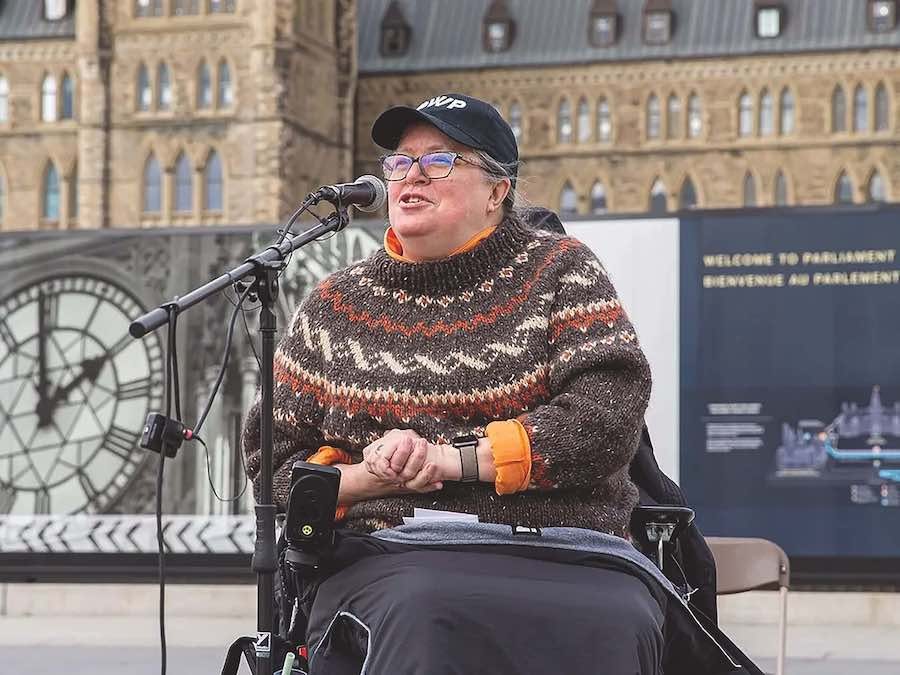Of all the stories Michelle Hewitt hears as a disability rights advocate in Kelowna, B.C., some of the most harrowing are from people who have to make impossible choices: medication or food? Rent or heat? Hydro or home care? For the 40 percent of low-income Canadians who live with a disability or chronic illness, poverty is inextricably bound to their health condition.
Now, an increasing number of Canadians with disabilities or chronic illness are facing an even starker choice: continue struggling to live in a society that often doesn’t meet their needs, or accept death. That’s the unintended dilemma posed by Bill C-7, the latest expansion of the eligibility criteria for medical assistance in dying (MAID), which came into effect about two years ago.
No longer restricted to terminally ill patients seeking a dignified, self-determined end, MAID is now also available to those who experience “grievous and irremediable suffering” as a result of a “serious and incurable illness, disease or disability.” Since the change, the number of MAID procedures jumped 30 percent to about 10,000 in 2021.
In theory, this freedom of choice is what most of us would want — but in practice, the choice given to disabled Canadians isn’t a free one at all. Legislators have failed to take into account how often dire economic circumstances, more than any physical symptom, seem to have motivated many MAID applications, according to high-profile media reports.
“What we’re seeing now is people accessing MAID because they’re desperate,” says Hewitt, who is chair of the lobby group Disability Without Poverty and has advanced multiple sclerosis. “They’re saying, ‘I don’t want to die, but I can’t live this life.’”
In February 2022, a 51-year- old Toronto woman known only as Sophia received MAID after a two-year search for affordable housing failed. Suffering from multiple chemical sensitivity, Sophia said her apartment had become intolerable and begged officials for help finding a home that wasn’t toxic to her — to no avail.
More on Broadview:
- Manitoba’s first medically assisted death in a church was an ‘intimate’ ceremony
- In some families, medical assistance in dying is anything but a peaceful ending
- ‘I’ve always believed that disability is part of God’s good design’
Hewitt believes that when MAID is offered, but adequate social supports are withheld, the subtext is that disabled lives aren’t worth living: “If a non-disabled person lived in poverty with black mould on their walls, no one would ask them, ‘Would you like to die instead?’”
In Belgium, the Netherlands and other countries where euthanasia is legal for non-terminally ill people, the law necessitates that alternative treatments or supports first be made available and tried. Canada has no such requirement.
Hewitt is cautiously optimistic that Bill C-22, now before the Senate, will introduce the Canada Disability Benefit, an in- come supplement that may help raise disabled Canadians to a basic living standard. But what’s needed even more is a change in mindset — one that assumes that people with disabilities have just as much right to a dignified life as they do to a dignified death.
***
Anna-Kaisa Walker is a freelance writer living in Toronto’s Greektown neighbourhood with her husband and daughter.
This story first appeared in Broadview’s June 2023 issue with the title “Would You Like to Die Instead?”
















I’ve lived here all my life and never have I seen disabled, through no fault of their own, we treated with absolutely no respect!
Dignity is a huge part of mental health, and without it there are going to be more innocent people dying from ignorant peoples’ rule that is so despicably preventable!
Give the people, dignity and grace and allow them to receive the means of being able to pay the necessary basics and have a little more on hand for emergencies or spending money like any normal Canadian should.
Oops your bias is showing.
Canada’s medical assistance in dying law is rooted in the Canadian Charter of Rights and Freedoms which provides for life, liberty, and security of the person. It also provides for equal treatment under the law. The safeguards are there. Two doctors or nurse practitioners, independent of one another, determine the patient’s eligibility. The request is always initiated by the person, who must be diagnosed with a grievous and irremediable medical condition, have a serious and incurable illness, disease or disability, be in an advanced state of irreversible decline in capability and be experiencing intolerable physical or psychological suffering.
Having a disability and living in poverty is another matter and the person would not be eligible for assisted dying.
The article is shocking in its inaccuracy and bias. In Canada, our MAID law, Bill C-7, allows for people whose natural death is not reasonably foreseeable, to receive medical assistance to die. There is a mandated minimum 90-day assessment period. The patient is to be assessed by two medical practitioners, one with expertise in the condition of the patient. The person would have to demonstrate capacity. and would have to be informed of all appropriate support services. The safeguards are there. A person requesting medical assistance in dying must be diagnosed with a grievous and irremediable medical condition, have a serious and incurable illness, disease or disability, be in an advanced state or irreversible decline in capability and be experiencing intolerable physical or psychological suffering.